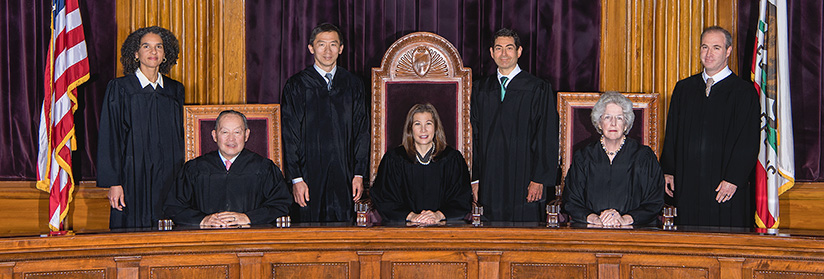
California Supreme Court (Photo: public domain)
Applying Dynamex Retroactively Is Fundamentally Unfair
Not only are the rules applying to app-based drivers convoluted, but they are also being unfairly applied retroactively
By Chris Micheli, September 22, 2021 4:05 pm
With this week’s federal appellate court decision, we can clearly see the fundamental unfairness of the retroactive application of the California Supreme Court’s Dynamex decision on classifying workers as employees or independent contractors. On Monday, September 20, the U.S. Court of Appeals for the Ninth Circuit, which covers much of the Western states and California specifically, reversed a federal district court verdict in favor of Grubhub.
Now the court is being required to use the “ABC Test” from the Dynamex decision, even though the Dynamex decision was rendered three months after the federal district court’s ruling in the Grubhub case!
That federal trial court decision occurred after a trial before a judge regarding whether drivers for Grubhub were properly classified as independent contractors, rather than employees as the drivers had claimed. In February 2018, Grubhub won its case in the federal trial court that it had properly classified its drivers as independent contractors under the Borello factors, which had been used by businesses, workers, and state agencies for nearly 30 years to determine proper worker classification.
Thereafter, at the end of May 2018, the California Supreme Court issued its decision in Dynamex Operations West v. Superior Court where they rejected application of the Borello test and instead adopted the ABC Test. The ABC Test is far stricter than the Borello factors. The losing drivers in the Grubhub case then appealed to the Ninth Circuit and argued that the federal district court judge should have applied the ABC Test.
In September 2019, the Ninth Circuit certified a question to the California Supreme Court, which was whether the ABC Test should be applied retroactively. Certification is the method by which the federal courts ask the state court to rule on a question of law based upon state constitutional or statutory grounds.
Just that month, in September 2019, the Legislature adopted and the Governor signed AB 5, which codified the ABC Test, along with many exemptions from that Test, making the new law effective January 1, 2020. The following year, in November 2020, the voters passed Prop. 22, which exempted app-based drivers from the ABC Test and made them independent contractors if four tests are met. A federal district court judge has ruled Prop. 22 unconstitutional on three grounds, but that decision is being appealed.
Earlier this year, in January 2021, the California Supreme Court addressed the retroactivity question in the Vazquez case and ruled that the ABC Test does apply retroactively to any pending cases. As a result, following general court rulings, the Dynamex case applies retroactively to all cases that were not yet final as of the date of its May 2018 Dynamex decision.
Just a few days ago, on September 20, the Ninth Circuit vacated the judgment in favor of Grubhub and instead told the district court judge to apply the “ABC Test” in this case, even though that Test was publicly declared three months after the Grubhub case had been decided. The Ninth Circuit, by the way, also said that Prop. 22 does not apply retroactively, which Grubhub conceded in this case.
Not only are the rules applying to app-based drivers convoluted, but they are also being unfairly applied retroactively. It is one thing to change the law, either in a court decision, a state statute, or by initiative, but it is something entirely different to apply new rules retroactively.
- Committee Versus Floor Lobbying - March 1, 2026
- Fishing Traps in California - March 1, 2026
- What Type of Lobbyist Do You Want to Be? - February 28, 2026




